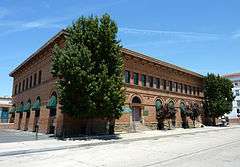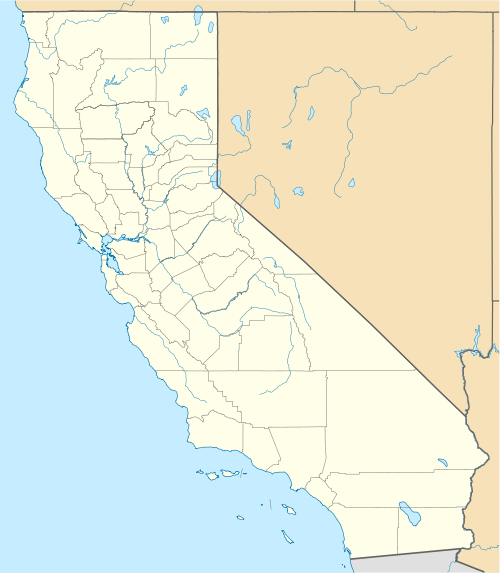Tevis Block
|
Tevis Block | |
 | |
   | |
| Location | 1712 19th St., Bakersfield, California |
|---|---|
| Coordinates | 35°22′36″N 119°1′14″W / 35.37667°N 119.02056°WCoordinates: 35°22′36″N 119°1′14″W / 35.37667°N 119.02056°W |
| Area | 0.4 acres (0.16 ha) |
| Built | 1893 |
| Architect | Schultze, Henry A. |
| Architectural style | Late 19th And 20th Century Revivals, Second Renaissance Revival |
| NRHP Reference # | [1] |
| Added to NRHP | March 29, 1984 |
The Tevis Block, also known as the Kern County Land Company Building, is a historic office building in Bakersfield, California. The structure was placed on the National Register of Historic Places (NRHP) on March 29, 1984.
Structure
The Tevis Block is a two-story, U-shaped structure constructed of imported fire brick. The front, south-facing facade has fanlight windows and terra cotta arches. Each floor is articulated differently and treated with a different order and finish. Basement windows are rectangular and bottom-hinged with a flat lintel. The first floor windows, two-sash and divided vertically with the fanlight transom, are enhanced by the brickwork to give the appearance of including mezzanine windows. The second-story windows are single-light sash with flat radiating bricks above. Above the second-story windows is a narrow frieze with square vents topped by a decorated boxed cornice capped by a high plain cornice. The rear of the building includes an enclosed elevator, added later, and a second-story, iron-railed walkway. An additional one-story brick wing was added to the building northwest corner in later years.[2]
Significance
The Tevis Block is the final vestige of the Kern County Land Company.[2] The Company was formed in 1890 by James Haggin and his brother-in-law Lloyd Tevis and prospered in developing the areas around the Kern River.[3] The building helped open up the Bakersfield downtown west of H Street and became a landmark upon construction. It was one of only a handful of unreinforced masonry buildings to survive the 1952 Kern County earthquake, and was subsequently strengthened, renovated and restored to a close proximity of its original architecture. It is considered a fine example of Second Renaissance Revival architecture.[2]
See also
- California Historical Landmarks in Kern County, California
- National Register of Historic Places listings in Kern County, California
References
- ↑ National Park Service (2009-03-13). "National Register Information System". National Register of Historic Places. National Park Service.
- 1 2 3 Chris Brewer, Historic Resources Inventory, State of California -- The Resources Agency, Department of Parks and Recreation, April 3, 1984; copy accessed from City of Bakersfield Cultural Resources Survey Downtown Area, located in the Local History room of the Beale Memorial Library, Bakersfield, California.
- ↑ Carleton E. Watkins Photography Collection, Kern County Library, Accessed December 28, 2010.